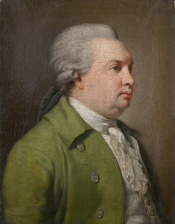
Presidential Library marks 280th anniversary of Denis Fonvizin
On April 14, (April 3, O.S.) 1745 in Moscow in a noble family Denis Ivanovich Fonvizin was born, a famous writer, creator of Russian domestic comedy, publicist, translator. He came from a Livonian knightly family. During the reign of Ivan the Terrible, during the war with Livonia, among other German barons, Peter von Wisin was taken prisoner, who later entered the Russian service. His descendants accepted Orthodoxy, became Russian people and the surname began to be written in fusion: Fonvizin.
On the portal of the Presidential Library in the collection Persons of Russia in the section Workers of Culture and Art readers can find a rare edition of 1772 - The Experience of Historical Dictionary of Russian Writers, which gives the following characteristic of Fonvizin: "This man is young, sharp, quite skilful in verbal sciences, also in Russian, French, German and Latin languages..."
The Presidential Library's portal also presents a volume dedicated to Fonvizin from The Complete Works of Prince P. A. Vyazemsky (1878-1896). The edition contains interesting facts about the life and work of the writer. In the preface, Pyotr Vyazemsky writes that originally the essay on Fonvisin should have been "limited to the limits of an article", but the article "grew into a book", and the reason for this was the cholera that raged in Moscow in 1830. The prince was forced to hide from the epidemic with his family in his estate near Moscow. He wrote: "For my amusement and comfort I felt the need for constant occupation. Fonvizin appeared to me then to help and in the joy.
Vyazemsky quotes in his book excerpts from Fonvizin's Confessions, publishes his letters to relatives and friends, business papers and other documents, which are "curious in their own way and bear the living traces of his customs and private life".
The father of the future writer Ivan Andreyevich Fonvizin lived in Moscow in his own house near Moscow University, served in the revision-collegium in the rank of collegiate councillor, liked "reading historical and moral works.
Fonvizin received his initial education under the guidance of his father Ivan Andreyevich. In 1755 the boy entered the newly opened gymnasium at the Moscow University. In the winter of 1759, among the best students, Denis Ivanovich travelled to St. Petersburg, where he was introduced to Count Ivan Shuvalov, the curator of the Moscow University. On this trip Fonvizin met Mikhail Lomonosov, as well as leading actors of the Imperial Theatre. These meetings made an unforgettable impression on the young man.
On his return to Moscow, Fonvizin entered the Philosophy Department of Moscow University. The student stood out among his comrades for his ability to perfectly translate texts from foreign languages.
After graduating from the university, Denis Ivanovich entered the service as a sergeant in the Semyonov Guards Regiment, but due to his good knowledge of foreign languages he was admitted to the Collegium of Foreign Affairs. The young man's abilities did not go unnoticed, and he was appointed secretary to the Cabinet Minister Ivan Perfilievich Elagin, "in charge of sorting out petitions to the highest name, and since 1766 - the imperial theatres.
Even in childhood, Fonvizin had a "penchant for writing". Fonvizin finished his famous comedy "Brigadier" in 1768. In it, the author satirically depicted the mores of the nobility, his predilection for all things French. The comedy made a strong impression on the public of the time and never left the stage.
In 1769 Fonvizin was appointed secretary to Count Nikita Ivanovich Panin, head of the College of Foreign Affairs. The new position gave the position that the writer was looking for. To this time belong his friendly relations with politicians, military men, diplomats. Under the guidance of Panin, Denis Ivanovich drafts various state reforms necessary for the good of the empire.
Fonvizin's second famous comedy Nedorosl, appeared in 1782. It was a huge success and provided the author with "fame and eternal importance in Russian literature". Very soon the play moved to the scaffolding of the imperial theatres. Alexander Pushkin called the comedy "folk" and Fonvizin "a friend of freedom" and "a bold ruler of satire".
A great shock for Fonvizin was the departure from life in 1783, Count Panin. The writer left the service, retired in the rank of State Counsellor. At this time Denis Ivanovich published in the magazine Sobesednik Lyubityeley Rossiyskogo Slova (Interlocutor of Lovers of the Russian language), founded by the director of the Academy of Sciences Catherine Dashkova, participated in the compilation of the first scientific dictionary of the Russian language – Dictionary of the Russian Academy.
In 1785 a tragedy happened to Fonvizin - due to a stroke and subsequent paralysis, the entire left side of his body was immobilised. The writer travelled to Europe for treatment, but it had no result.
The poet Ivan Dmitriev, who met with the writer on the eve of his death, told about the last hours and unbending character of Denis Ivanovich Fonvizin. Fonvizin entered Derzhavin's study, supported by two young officers... He could no longer hold one hand, nor could one leg become shriveled... but his large eyes sparkled quickly. At eleven o'clock in the evening Fonvizin went home, and the next morning, 12 December 1792, he died. The writer was buried in St. Petersburg in the cemetery of the Alexander Nevsky Lavra.

